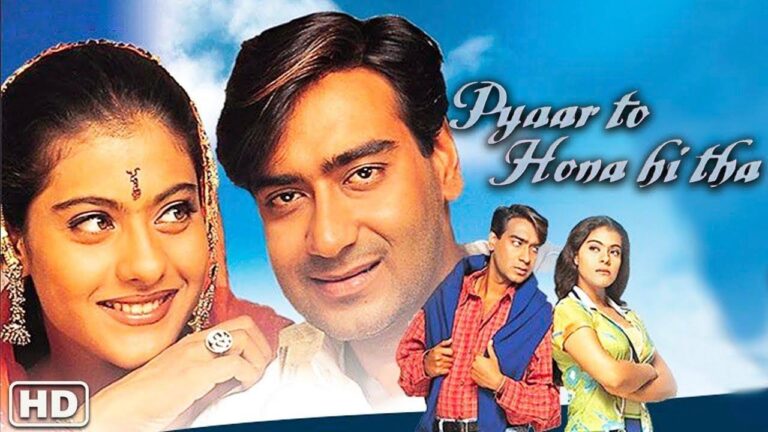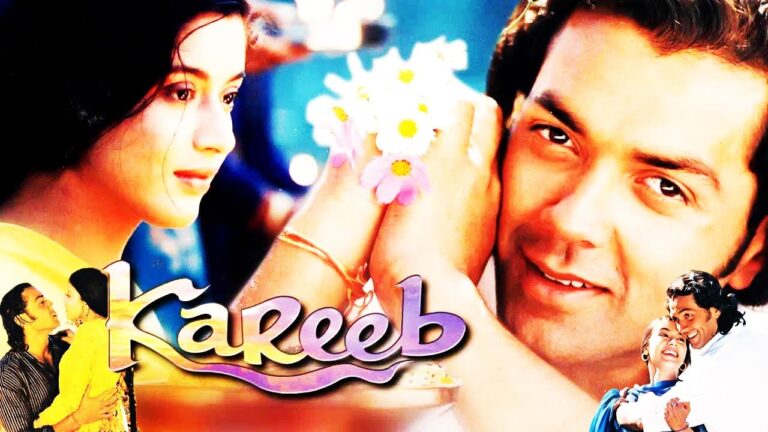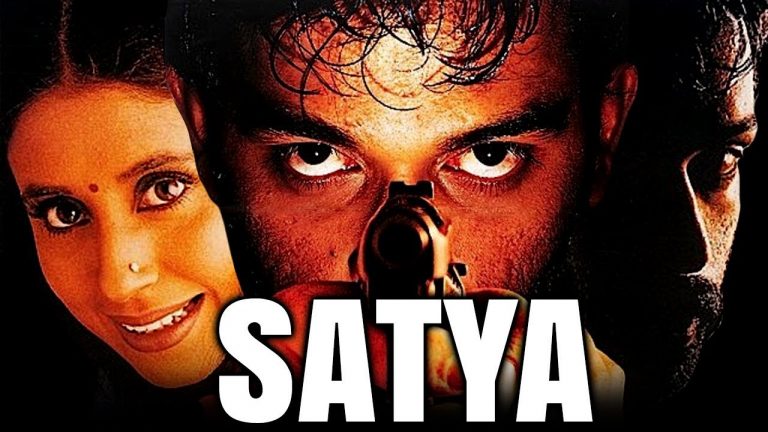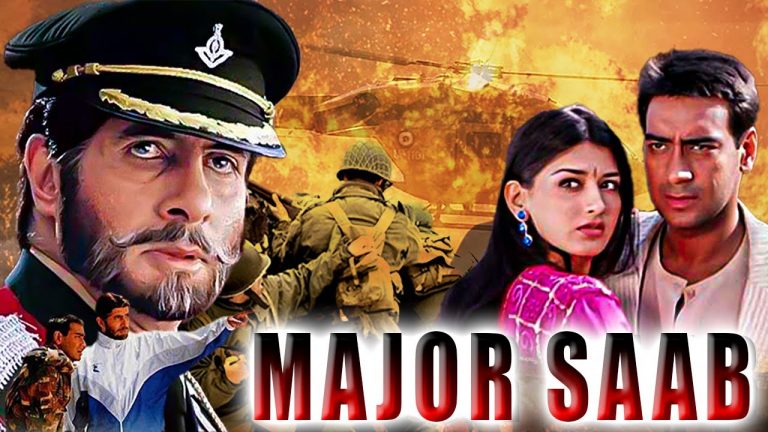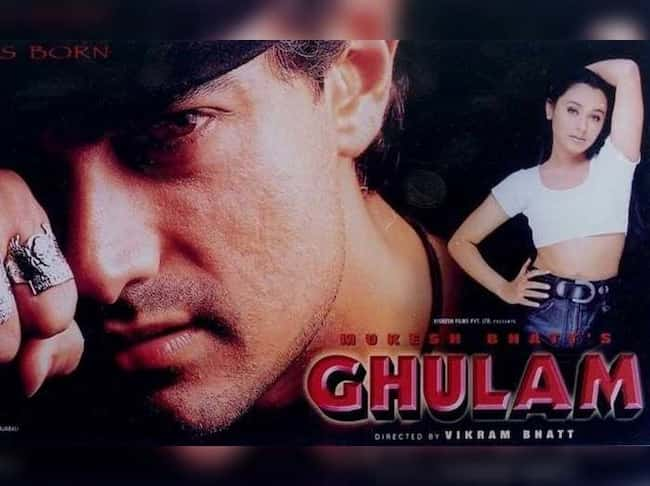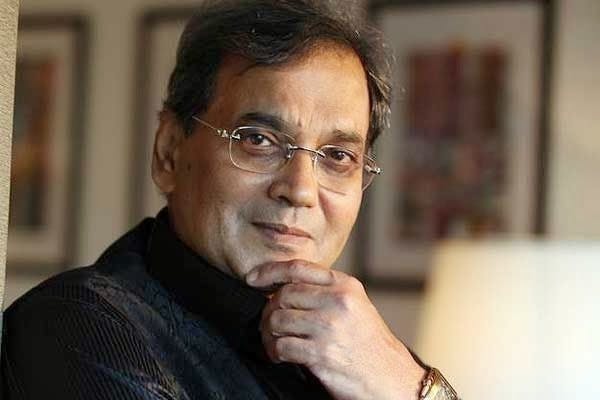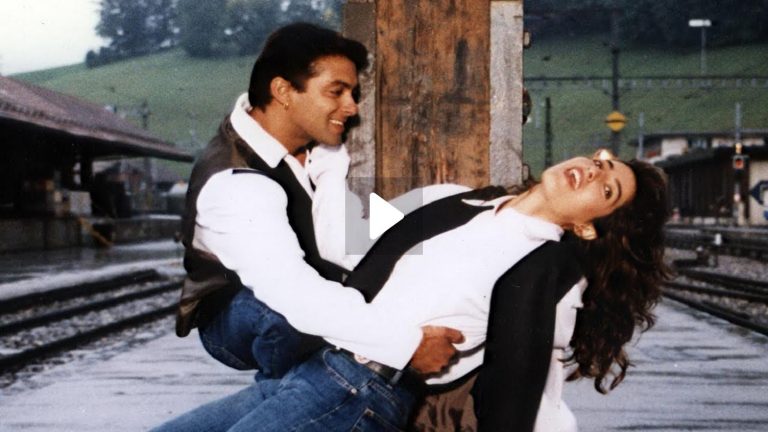PYAAR TO HONA HI THA
Baba Films’ Pyaar To Hona Hi Tha is a love story with a difference. Inspired from the Hollywood film, French Kiss, it is the story of a girl who comes to India from Paris to win back her fiancé who has fallen in love with another rich girl. On her flight from Paris to India, the girl meets a guy who is a jewel thief. He hides his loot (a diamond necklace) in the girl’s handbag and then what follows is a long chase. By the time he does get to the necklace, he also gets close to the girl and promises to help her get her fiancé back. In doing, so, the Paris girl and the Indian thief (who, incidentally, has a heart of gold) fall in love. Ultimately, the fiancé is dumped, and the two of them express their love for each other.
The first half is not too serious except for the couple of reels before interval. The chase is stretched too much so that it becomes boring. Of course, the pre-interval portion, like the second half, does have some really cute moments but while some of them are of the kind which will be appreciated by the gentry only, the others (of universal appeal) are few and far between. Besides, the Paris girl trying to win back her fiancé even after seeing him openly flirting with another girl looks quite unbelievable, if only because of two reasons — one, their love has not been established, and secondly, the fiancé‘s role is played by an actor (Bijay Anand) who does not have any star image. On the other hand, the Paris girl is a star (Kajol) and so is her Indian friend (Ajay Devgan). The base of the story, therefore, appears to be weak. It is for this reason that while the audience do not really crave to see Kajol and Ajay Devgan united in matrimony, they also do not weep when it appears that their love may not triumph. In short, the viewers do not move with the lovers. Ajay not being able to express his love to Kajol does not appeal after a while.
Dialogues are witty at many places. Screenplay writing, on the other hand, shows too much recourse having been taken to cinematic liberties. Climax, though fairly exciting, is not novel.
Ajay Devgan does a good job, but because he has an image of an action hero, his fans may not really cherish seeing him in a romantic role, devoid of any action or stunts. Kajol is the life of the film and delivers a simply fantastic performance. She is cute and natural to the core and endears herself to the audience right from the word ‘go’. She looks pretty too. Bijay Anand does a fair job, but an actor with a star image was the actual requirement of the role. Kashmira Shah is so-so. Tiku Talsania does quite well. Om Puri’s talent has not been utilised properly in the role of a police officer whose character is quite unbelievable. Harish Patel lends good support. Mushtaq Khan leaves a mark. Anjan Srivastava, Ghanshyam, Reema, Asha Sharma, Poornima Bhave, Satish Kaul, Shama Deshpande, master Mohsin, master Sharukh and Anant Mahadevan provide the desired support. Remo Fernandes and Jaspinder Narula impress in a song that’s racy.
Anees Bazmee’s direction is fair but his writing should have been far more convincing and much more taut. What was needed the most was to make the borrowed story more plausible and more Indian. Besides the song in the title (a better situation for that hit song would have made a positive difference), the last two songs (‘Jab kisi ki taraf’ and ‘Ajnabi mujhko’) are extremely well-tuned (Jatin Lalit) but they both come too late in the drama. The aeroplane song is dull while the rest are okay. Nirmal Jani’s camerawork is splendid. Action is alright. Art direction is very good. Production and technical values are of a high standard.
On the whole, Pyaar To Hona Hi Tha has cute moments but not the magic and pain of a love story. It has a fantastic initial value (due to bumper publicity, popular music and the lead pair) but not the merit to sustain and go for a long run. The film rests on a weak foundation and, therefore, remains an average fare, mainly for ‘A’ class centres, especially in Bombay and South.
Released on 23-7-’98 at Metro and on 24-7-’98 at 11 other cinemas of Bombay thru Devgan’s Entertainment. Publicity: extraordinary. Opening: excellent. …….Also released all over. Opening was superb everywhere. However, quite a perceptible drop was noticed in collections in some stations of C.P. Berar on the second day (Friday).
ANGAARAY
Rose Movies Combines’ Angaaray (A) is about life in the world of crime in Bombay. A young police inspector is sent to Bombay to get to the root of the underworld and to exterminate the anti-social elements. He is shocked to find his childhood friends as a part of the underworld. Actually, he, too, would have been a part of it had he not been arrested for a crime while still a child. After his punishment, he got an opportunity to reform himself, which he had done. He was now keen to show his friends the right path. He also knew that they (friends) were mere pawns in the hands of the don who actually needed to be finished. The climax deals with the elimination of the don and the reformation of two of his three friends, the third having been killed by the don.
Although an action film, it moves at a very slow pace, especially in the pre-interval part. The pace picks up a bit in the second half in which there’s abundant action. But there’s no relief or entertainment in the whole film. There’s no novelty, neither in the subject nor in the presentation. The character of the don is quite weird and unnecessarily mysterious. Dialogues are okay.
Akshay Kumar does well in the role of a police inspector. His stunts in the initial reels are very good. Nagarjuna, as his friend, is good. Pooja Bhatt has a small role and does a fair job. Sonali Bendre’s character is shown in poor light; she performs well and even her dialogue delivery, which is otherwise lifeless, is good. Irfan Kamal is fair. Paresh Rawal, though reasonably alright, is not in his elements. Gulshan Grover plays the weird don quite well. Mohan Kapur is average. Razzak Khan leaves a mark. The other artistes lend the desired support.
Mahesh Bhatt’s direction is routine. No attempt seems to have been made by him to offer something fresh to the viewer and, what’s more, too much has been taken for granted. Music is functional; ‘Aan de aan de’ and ‘Tanha tanha’ are fairly good but the other songs are dull. Song picturisations are ordinary. Camerawork (Sameer Arya) is of a good standard. Action should have been much more exciting (like Akshay’s stunts).
On the whole, Angaaray is an action film for ‘B’ and ‘C’ class centres only.
Released on 24-7-’98 at Minerva and 18 other cinemas of Bombay by Vimal Agarwal thru R.M. Ahuja & Co. Publicity: fair. Opening: very good. …….Also released all over.
LATEST POSITION
Kareeb has not been appreciated and it began to drop from the 2nd day itself. It has, nevertheless, done well in some ‘A’ class centres. Bombay 32,46,775 (83.36%) from 7 cinemas (4 on F.H.); Ahmedabad 1,75,151, full (1 unrecd.), Vapi 2,70,494, Baroda 1,75,895; Pune 4,78,295 from 2 cinemas (1 in matinee), Solapur 1,01,843; Hubli 92,340 (100%), Belgaum 92,180 (100%); Delhi 32,75,624 (88.90%) from 7 cinemas; Kanpur 1,70,650, Lucknow 2,69,743, Agra 1,70,150, Allahabad 96,600, Varanasi 1,49,403, Bareilly (6 days) 71,404 (37.01%); Amritsar 52,500; Calcutta 9,74,147 from 3 cinemas; Nagpur 3,53,305 from 2 cinemas, Jabalpur (6 days) 1,01,806, Amravati 1,06,284, Raipur (6 days) 99,423; Bhopal (6 days) 2,75,866 from 2 cinemas; Jaipur 4,70,592 from 2 cinemas, Bikaner 1,69,795; Hyderabad 19,08,447 from 8 cinemas, share 8,60,000.
………..
Dulhe Raja is quite good. 2nd week Bombay 22,70,855 (62.82%) from 10 cinemas (5 on F.H.); Ahmedabad 3,91,997 from 3 cinemas, Jamnagar 76,860; Pune 4,62,324 from 4 cinemas (1 in matinee), Solapur 1,88,445 from 2 cinemas; Delhi 20,33,438 from 10 cinemas (1 on F.H.); Kanpur 3,43,319 from 2 cinemas, Lucknow 2,20,542, Agra 1,50,000, Allahabad 1,46,500, Varanasi 1,51,635, Bareilly 1,30,942 (60.61%); Calcutta 5,56,679 from 6 cinemas; extraordinary in 2nd week in Bihar; Nagpur 1,66,934 from 2 cinemas, Amravati 1,16,413, 1st week Akola 1,94,532, 2nd week Raipur 1,18,045 (1st 1,70,101), Jalgaon 1,15,000, Yavatmal 87,354; Indore 3,11,494 from 2 cinemas (2 on F.H.), Bhopal 2,82,724 from 2 cinemas; Jaipur 8,45,612 from 3 cinemas; Hyderabad 4,17,064 from 2 cinemas (1 in noon).
Satya is a super-hit in Bombay and Maharashtra and Nizam but average/losing in the other circuits. 3rd week Bombay (TF) 42,95,740 (94.11%) from 9 cinemas (6 on F.H.); Ahmedabad 1,44,189 from 2 cinemas (2 unrecd.), 1st week Padra 78,564, 3rd week Rajkot 80,569; Pune (TF) 9,91,555 from 4 cinemas (1 in matinee), Solapur (TF) 3,56,320 from 2 cinemas; Delhi 6,49,689 from 3 cinemas; Kanpur 1,05,017, 1st week Lucknow 2,53,172, 3rd week Allahabad 61,000, Varanasi 70,355, Dehradun 74,189; Calcutta 3,33,666 from 3 cinemas (1 in noon); Nagpur (TF) 1,64,599 (91%), Jabalpur 44,954, total 1,41,478, Amravati (TF) 1,63,617, Akola (TF) 90,066, total 2,50,092, share 1,88,000, Raipur 63,048; Bhopal 78,005; Jaipur 71,139, Ajmer 53,769; Hyderabad 4,08,246.
Major Saab 4th week Bombay (TF) 9,82,590 (72.67%) from 3 cinemas (3 on F.H.); Ahmedabad 56,667, Vapi 1,50,946,total 9,68,826, Rajkot 39,000, 1st Adipur 1,45,160, 4th week Jamnagar 23,881, 2nd week Bhuj 51,735 (1st 1,07,371); 4th week Pune (TF) 3,42,328 from 2 cinemas, Solapur (TF) 70,979, 1st week Barsi (TF) 40,034; 4th week Hubli 64,159 (3rd 85,915); Delhi 8,72,424 from 5 cinemas (1 on F.H., 1 unrecd.); Kanpur 1,44,258 from 2 cinemas, Lucknow 1,34,936, Agra 1,25,700, Allahabad 80,000, Varanasi 94,781, Bareilly 25,072 (13.14%), Dehradun 88,000; Rohtak 12,063; Nagpur (TF) 44,795, Jabalpur 93,328, total 6,26,116, Amravati (TF) 68,733, Akola (TF) 43,519, total 2,87,560, share 2,12,000, Dhule (TF) 36,367, Raipur 35,034, Jalgaon (TF) 64,138, total 3,31,518; Indore 88,931, Bhopal 50,129; Jaipur 2,24,015; Hyderabad 3,15,943 from 3 cinemas (2 in noon).
Ghulam 5th week Bombay 21,18,990 (60.42%) from 9 cinemas (7 on F.H.); Ahmedabad 2,22,372 from 4 cinemas, Rajkot (matinee) 9,509 (1 in regular unrecd.); Pune 4,37,914 from 4 cinemas (1 in matinee), Kolhapur 1,65,000 (4th 1,75,000), total 9,23,380, Solapur 84,655 from 2 cinemas; Delhi 3,87,853 from 2 cinemas (1 on F.H.); Kanpur 28,093, Lucknow 82,561, Allahabad 31,000, Varanasi 55,600, 1st week Bareilly 75,164 (33.64%), 5th Dehradun 48,252; 2nd week Rohtak 10,813; 5th week Calcutta 1,39,020; Nagpur 1,08,606 from 2 cinemas, Jabalpur 1,19,228, total 8,78,064, Amravati 87,521, total 8,16,263, Akola 47,819, total 5,00,182, share 3,70,000, Dhule 40,000, Raipur 64,459, 4th week Jalgaon (6 days) 62,625, 1st Yavatmal 1,27,244; 5th week Indore 63,250, Bhopal 63,516; Jaipur 1,13,360; Hyderabad 5,25,933 from 3 cinemas (2 in noon).
FILM INDUSTRY TO DOWN SHUTTERS ON AUGUST 11
The Bombay film industry will down shutters on 11th August in protest against the government’s inaction in the matter of cable piracy of Hindi films. All film activities viz. production, distribution, exhibition, recordings etc. will remain closed on 11th. A mass rally consisting of members from all sectors of the industry will be organised in Bombay on that day. The rally, which will begin at Juhu, will terminate at Mantralaya where a delegation will meet the Maharashtra chief minister and submit a memorandum to him, urging the government to take quick and stern action against pirates of Hindi films. The rally will also, en route, pass the office of Siticable at Worli. The decision of the rally was taken during a meeting of representatives of all the sectors of the film industry — production, distribution, exhibition and cine workers — held at IMPPA House on 22nd July.
Illegal screenings of Hindi films on cable have spelt huge losses for the film industry in the past few years. The racket of cable piracy has flourished over the years in spite of the Indian Copyright Act being one of the most stringent and comprehensive legislations in the world. On its part, the government has amended the Copyright Act in 1984, making the piracy of films a cognisable and a non-bailable offence, yet it has failed to convict even one offender in 14 years since. The reason for this, according to IMPPA, is the apathetic attitude of the state law enforcement agencies towards the issue. As a result, the menace of cable piracy has continued to thrive under the aegis of major cable networks like Siticable and IN Network, alleges IMPPA. The decision to down shutters and organise a mass rally comes in the wake of this realisation. An Action Committee Against Cable And Other Piracy has also been formed by IMPPA to take up necessary follow-up action in the matter.
It may be recalled here that a few weeks ago, the Tamil film industry had resorted to a similar protest rally in Madras, after which it succeeded in getting several concessions for itself.
ASHA PAREKH IN OFFICE
The newly appointed chairperson of the Central Board of Film Certification, Asha Parekh, has begun attending the CBFC office at Bharat Bhavan, Bombay, from 20th July. She succeeds Shakti Samanta who held the office for three consecutive terms (almost seven years).
Lot Of Anand At Bakshi’s Birthday
His 68th birthday on 21st July is the one which veteran and celebrated lyricist Anand Bakshi will remember all his life. Showman Subhash Ghai celebrated the young-at-heart song writer’s birthday in great style at The Leela, where rich eulogies were paid to Bakshi’s writing prowess.
Although the show started almost two hours late due to unavoidable circumstances, the wait was worth its while. An audio visual on Anand Bakshi, made by Plus Channel, traced the growth of Anand Bakshi as a lyricist, beginning from his childhood days when, perhaps, he did not even in his wildest of dreams imagine that he would one day become a legendary name in the world of dreams. The informative AV presentation, with lucid commentary by Javed Siddiqi, was followed by recital of songs written by Anand Bakshi, by some top playback singers. People like Yash Chopra, Subhash Ghai himself, Hasan Kamal, Nida Fazli, Javed Akhtar, Shabana Azmi, Jagjit Singh and Dilip Kumar praised Anand Bakshi’s works.
Bakshi has had a 20-year association with Subhash Ghai, having penned all the songs of all films made under Ghai’s Mukta Arts banner. In lyrics writing, he has completed 42 years.
Shabana Azmi greeted Anand Bakshi with a huge garland ordered by Ghai specially for the occasion. A memento was also presented by Ghai to Bakshi. Javed Siddiqi was the efficient master of ceremonies.
A huge birthday cake was cut by Anand Bakshi well after midnight.
Subhash Ghai also celebrated the golden jubilee of Pardes at the same party.
‘Prem Aggan’ Music Released With Pomp And Show
Feroz Khan launched the music of his Prem Aggan on 18th July at a function at The Leela. BMG Crescendo is marketing the film’s music released by UTV. The audio cassettes were formally released by Sanjay Dutt and Manisha Koirala.
Two songs from the film were screened for the invitees and this was followed by a live rendition of a couple of songs by the film’s playback singers. At least one song has been picturised on some breathtaking locations of Australia. The music of Prem Aggan is scored by Anu Malik. The songs are of the kind which definitely grow on the listener.
The film introduces Fardeen Khan and Meghna Kothari. At the music release function, Feroz Khan introduced the stars and music director of his film, Anu Malik, to the gathering which mainly consisted of the film’s cast, technicians, music dealers, UTV and BMG people, selected guests and media persons.
PRODUCTION NEWS
‘Soldier’ Complete
The entire shooting and dubbing of Tips Films’ Soldier have been completed. Background music is being recorded at Empire Audio Centre. Starring Raakhee Gulzar, Bobby Deol, newcomer Preity Zinta, Suresh Oberoi, Ashish Vidyarthi, Sharat Saxena, Johny Lever and Farida Jalal, the film is directed by Abbas Mustan. Music: Anu Malik. Story: Shyam Goel. Screenplay: Sachin Bhaumick. Dialogues: Javed Siddiqi. Lyrics: Sameer. Cinematographer: Thomas A. Xavier. Action: Akbar Bakshi. Editor: Hussain Burmawala.
‘Kuch Kuch Hota Hai’ Unit Returns
The unit of Dharma Productions’ Kuch Kuch Hota Hai has returned to Bombay after completing a 15-day shooting schedule in Scotland. The entire cast participated. Starring Shah Rukh Khan, Kajol, Rani Mukerji, Neelam (friendly appearance), Anupam Kher, Farida Jalal, Archna Pooran Singh, Himani Shivpuri, Johny Lever, baby Sana and Salman Khan in a special appearance, the film is being produced by Yash Johar and directed by Karan Johar. Music is scored by Jatin Lalit. Lyrics: Sameer. Cinematographer: Santosh Thundiyil. Choreographer: Farah Khan.
YOU ASKED IT
Why are banks not willing to finance film producers?
– Mainly for two reasons — uncertainty of the business, and the big component of black money involved in film transactions.
Why have films started behaving differently in different circuits rather than faring the same way all over India?
– If a film’s script is powerful and its music is hit, it is bound to do equally well in every circuit. The difference arises in the case of other films because audience tastes have begun to vary region-wise.
Which is the hottest territory today?
– Where are the distributors today that you are talking of the hottest territory? The ‘heat’ comes from a project, that too, before its price/ratio is announced. Other than that, it’s all thanda.
STRAY SUGGESTIONS
* Bobby Deol has cut his long hair short. Good! He should now also cut down his price. Look at Kareeb.
* Pooja Bhatt must really be the busiest heroine around. Don’t believe? Then see Angaaray. Although it is directed by her father, Mahesh Bhatt, the poor girl didn’t have the time to complete her dubbing.
* Govinda should seriously consider completing his films on time. He did it in Dulhe Raja and look at the results. Govinda, after dancing his way into the hearts of the audience, can now also dance his way into the hearts of his producers and directors by reporting on his sets on time. For, time and tide wait for no man.
* Amitabh Bachchan could do with signing a film with a director who has delivered hits in recent times rather than restricting himself to directors who had delivered hits when he (Bachchan) used to be in his prime — years ago!
* Shilpa Shetty should seriously take tips from new love, Akshay Kumar, on dressing. Her costumes in films are always being criticised. Akshay’s clothes are never bitched about. Half the times, he wears nothing except trousers!
* Aishwarya Rai must now try to get over her Miss World image. Models are known to be stiff. But Aishwarya is not stiff. She is very, very stiff. Sniff!
* I & B minister Sushma Swaraj has done a good job of constituting an Advisory Board, Film Export Promotion Forum etc. She should now form a Script Board to advise our film writers on how to write stories and screenplays. If films start running, there’ll be no need for other Advisory Boards.
DO YOU KNOW?
* Rumours were rife earlier this week that Subhash Ghai had replaced Aishwarya Rai from TAAL and had signed Mahima Chaudhry in her place. Of course, the rumours were baseless as Aishwarya continues to be the film’s heroine.
* Ghazal maestro Jagjit Singh has launched an exclusive brand of kurtas called Jagjit kurta. The singer usually wears kurta with churidar in his concerts. Jagjit Singh has plans to extend the product line to include sunglasses, pens, clocks, watches etc. in times to come.
* Ashok Talkies, Jalgaon, is screening a festival of tax-free films! Or almost so. The tax-free MAJOR SAAB is running at the cinema in its 5th week. It will be followed by the tax-free DUSHMAN. After that, it will screen SATYA which also is tax-free in Maharashtra.
MIX MASALA
NO SMOKING
Anupam Kher has given up smoking. This is not the first time the actor has quit the habit but he’s very serious now, that he won’t light the cigarette again. Hope his resolve doesn’t go up in smoke!
3-E
Education-Entertainment-Enlightenment
How About This Birthday Gift, Mr. Ghai?
Subhash Ghai’s exemplary gesture of throwing a lavish party to celebrate Anand Bakshi’s 68th birthday has invoked high praise from all quarters. This fine gesture speaks volumes for the affectionate bond that the showman and the poet share between them. While this party will surely be cherished by Bakshi as one of the best birthday gifts he has received, one is sure, the celebrated lyricist would have been even happier had Ghai given him a song to sing in Taal and announced this at the birthday party. In a recent interview with Film Information, Anand Bakshi had expressed a keen desire to sing at least one memorable song in a film before he hangs his boots. In fact, he had gone to the extent of saying that his only fervent desire was that the people should remember him more for a memorable song sung by him than for those he had penned! This wish of his can be fulfilled by Subhash Ghai even now, so what if the birthday is gone. He could offer his favourite lyricist a singing opportunity in his forthcoming Taal. And should he really do so, it would be a great move, for, this would mean a unique occurrence of one of the oldest lyricists singing for one of the youngest music directors of today (A.R. Rahman).
Better Late Than Never
It seems that writers Rajiv Kaul and Praful Parekh had the story of Dulhe Raja for several years before Harmesh Malhotra made it. They repeatedly approached a number of producers with the story during those years, but without any success. With each producer rejecting the story, the chances of it being ever made into a film looked extremely bleak. It almost seemed as though the Dulhe Raja would never get married for want of baraatis! But, luckily for Kaul and Parekh, producer-director Harmesh Malhotra spotted the story’s potential as late as a year ago.
Boomtime In Bengali Film Industry
At a time when the Hindi film industry is struggling to grapple with its fluctuating fortunes at the box-office, at least one regional film industry is experiencing an unprecedented boom. As many as 35 to 40 Bengali films are currently under-production. Moreover, a number of Bengali films have succeeded in hitting the bull’s eye at the box-office in the recent past. A producer like Dilip Kankaria is making/planning at least four to five Bengali films. While low admission rates due to a reasonable entertainment tax of only 20% on Bengali films may explain the viewers flocking to cinema halls in large numbers, the current boom in the Bengali film industry has adversely affected distributors of Hindi films (which, incidentally, pay 70% entertainment tax) in the circuit. A number of exhibitors in West Bengal run mostly Bengali films only. While on the topic, another regional industry which is experiencing a similar boom, though of smaller proportions, is the Gujarati film industry. Following the runaway success of Govindbhai Patel’s Desh Re Joya Dada Pardesh Joya, as many as 15 to 20 Gujarati films are in various stages of production.
‘Kareeb’ & Liberty
It is a coincidence, and a strange one at that. Power failure disrupted the Kareeb screening on the opening day in the same show in two Liberty cinemas — of Bombay and Delhi. Bombay’s Liberty was in pitch darkness for over an hour in the 6 p.m. show on 17th July. In Delhi’s Liberty, power supply played truant two or three times in the 6 o’clock show, for 10-15 minutes each time.



























